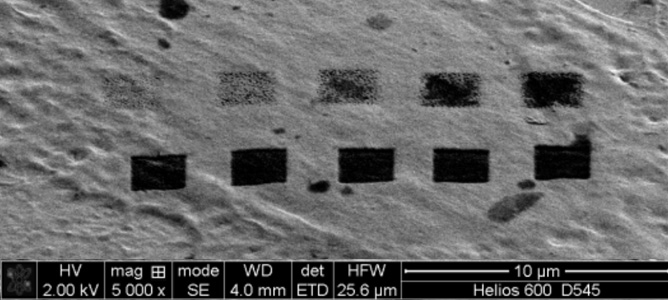Nanoscale study of biological cells

SEM image of a single cell showing the FIB milled areas. The top row shows 1x1 μm2 areas milled at 5 kV, and the bottom row shows 1x1 μm2 areas milled at 30 kV.
February 2012
Focused Ion Beam Scanning Electron Microscopes (FIB-SEM) are able to mill away at layers of a material in a very small, very uniform way. This is enabling the study of biological cells on a nanoscale as researchers at MCN and Monash University are utilising the FIB-SEM as well as protein nanoprobes to study protein assemblies and their place within cells. This project aims to find the optimum FIB milling conditions to mill away a very small, uniform thickness (10nm - 50nm) of a single biological cell. The ability to selectively remove such a thin, uniform layer from a single cell, coupled with protein nanoprobes, will be able to describe protein assemblies and their associated locations inside a cell, providing valuable information for drug delivery and targeted therapies.
As an initial stage, the team are characterising the FIB milling rate of a single biological cell at different beam conditions. Initial experimental results indicate that the FIB milling rate at 30kV is approximately 2μm3/nC, while the milling rate at 5kV is approximately 0.6 μm3/nC, indicating that it may be more suitable to use the FIB at 5kV for delicate milling of cells.
Further experiments are currently underway to validate initial findings and to characterise the cell morphology before and after FIB milling to determine the damage caused by the FIB milling process.


